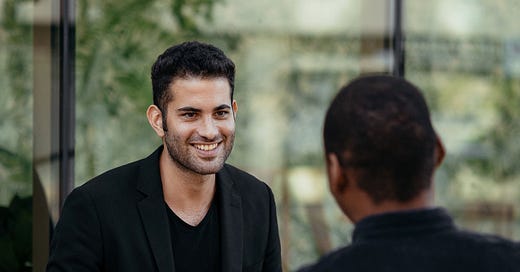People Approach Informational Interviews Incorrectly
Why The Person Should Take Precedence Over The Information
Key Takeaways:
The person behind the interview matters far more than the information you glean for various reasons
1) Information is ubiquitous and the odds that you get novel information that will drastically change your decision-making in the internet age is less likely than many people realize
a. The ubiquity of discussion boards like Reddit and Discord servers which foster unique/false/differing opinions
b. The ubiquity of advice from blogs, newsletters, podcasts, and books
2) You need to filter their advice according to their experiences and biases. If you do not know that the person is anxious, or is irritated with authority, or a people-pleaser, you won’t be able to translate their advice to your local context.
Someone who is hypercritical will talk about how terrible their field is and you need to assess the veracity of their claims accordingly.
Information Overload and the Quest for Novelty
In an era where information flows like a never-ending river, seeking that groundbreaking nugget of wisdom can feel like searching for a needle in a haystack. Think about it – how often does the information you stumble upon during interviews truly revolutionize your decision-making process? Odds are, not as frequently as you might think.
a. **The Labyrinth of Opinions**: Picture the myriad discussion boards, like Reddit and Discord servers. They're teeming with a cornucopia of perspectives – some unique, some dubious, and some outright false. Amidst this digital babel, it becomes a challenge to discern what's genuine and valuable.
b. **The Overflow of Expertise**: Blogs, newsletters, podcasts, and books are at your fingertips, offering advice and insights from every conceivable angle. This abundance of guidance often muddles the waters, leaving you wondering whose counsel to trust.
Unmasking Biases: Why the Interviewer Matters
Let's zoom in on a pivotal truth: every piece of advice is not a one-size-fits-all solution. The personal experiences and biases of the interviewee play a crucial role in shaping the wisdom they impart. Understanding their context is the key to effectively translating their guidance into your own reality.
I remember a premed who had just gotten into medical school grabbed lunch with me to discuss the nitty gritty details of how I can get into medical school. He was quite an anxious person and consistently reminded me to not get too stressed about getting into medical school. I shouldn’t spend hours on reddit listening to stories about the horror stories of medicine. The advice was not for me.
Consider this scenario: You're seeking advice on navigating a challenging work situation. Now, imagine the person offering advice is inherently anxious, irritated by authority, or a notorious people-pleaser. Without this background knowledge, their insights may fall flat in your unique context. Why? Their unique contextual factors are informing their advice. If you are oblivious to it, you won’t be able to translate it to your context.
For example, imagine encountering someone who's perpetually hypercritical – always highlighting the negative aspects of their field. While their perspective might seem accurate, it's crucial to remember that they're wired to criticize even the plushest first-class plane seat for the company it keeps. Recognizing their inclination towards criticism allows you to take their advice with a pinch of salt and apply it judiciously.
The interview is not just about extracting data; it's an art of understanding the storyteller. The person behind the interview is a walking library of experiences and biases that can reshape your perspective and guide your decisions. In a world awash with information, let's not overlook the power of context and human insight – for it's the essence of the interviewee that truly matters.
Hence, I remind myself to not only listen to what people are saying, but also to who they are.




